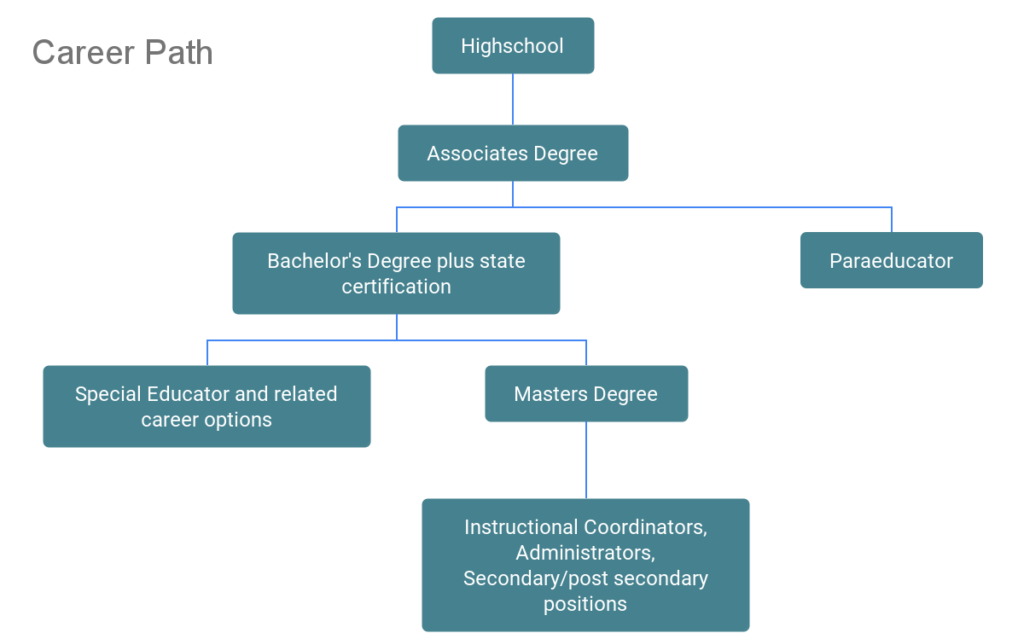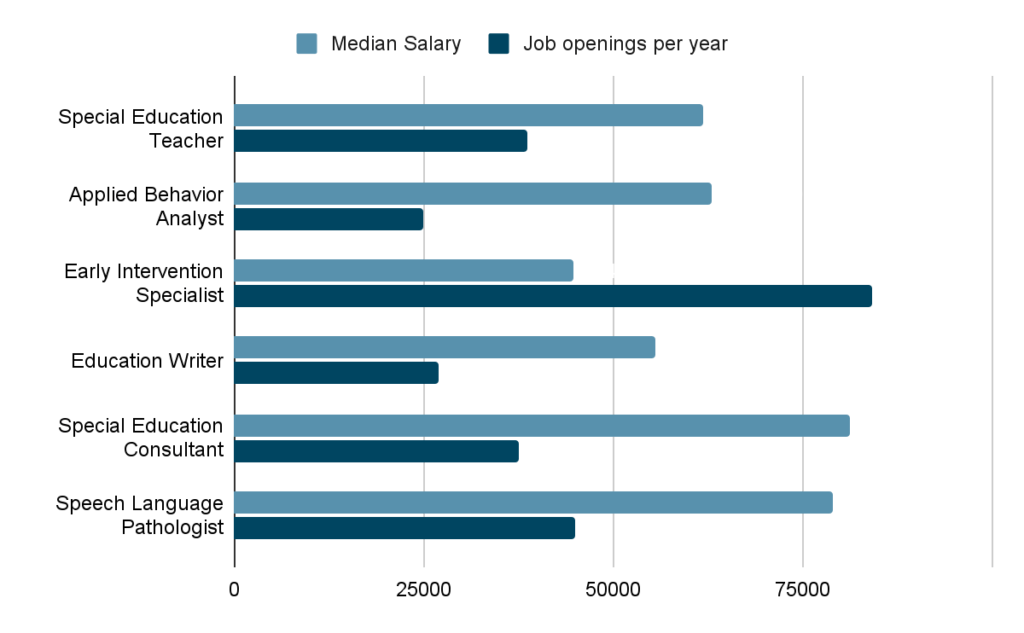A special education teacher is an important professional who helps students with disabilities learn in a safe and effective environment. Special education teachers provide instruction and support to students with a wide variety of disabilities, including those with autism, down syndrome, cerebral palsy, or other physical disabilities. In addition to teaching the general curriculum, special education teachers work with students to develop Individual Education Plans (IEPs) and coordinate services that meet their individual needs.
A recent study has shown that the percentage of children in schools who received special education services has been gradually increasing over the last few years. While it remains a very small minority, the study suggests that more and more children are being identified as needing special assistance. This could be due to several factors, including the growing awareness of the importance of Special Education services and increased funding for this type of programming.
Can You Get A Special Education Degree Online?
Many schools offer online programs in special education. An online degree in special education may be an effective way to pursue a higher level of education without leaving home.
Here is a summary of available online programs for special education.
| Program | Credits (may vary) | Entry requirements |
| Associates Degree | 60 credit hours | High School/ equivalent |
| Bachelor’s degree | 120 credit hours | High School/ equivalent in some cases, an associate’s degree |
| Master’s Degree | 30 credit hours | Undergraduate degree, relevant experience in the field. |
Online Associate Degree in Special Education
An associate degree in Special Education is excellent for students who intend to transfer credits to a 4-year program in teaching. These colleges provide a perfect opportunity for aspiring special educators to complete various general education requirements at a cheaper tuition rate. Associate degree holders in special education may also pursue employment as Special Education Paraeducators. Paraeducators work under the supervision of a certified teacher to help students with learning disabilities, including those with health needs.
Requirements to become a paraprofessional include:
- Hold a high school diploma or equivalent.
- Hold at least an associate’s degree.
- Pass a formal state assessment that qualifies individuals to assist in writing, reading, and math instruction.
Here is a list of online Special Education Associate’s Degrees.
1. Northampton Community College – $203 per credit
The N.C.C.’s Special Education Associate of Arts program values diversity, equity, and inclusion. Students study evidence-based theory and practices to comprehend family and disability perspectives and the significance of collaborative relationships. The program offers classroom observations and hands-on experience opportunities throughout the entire program to ground students’ understanding of practical educational approaches, including Universal Design for Learning.
Quick Facts
Credit Hours: 62 credits.
Accreditation: Higher Learning Commission (H.L.C.).
Entry Requirements: Associate’s Degree or a Bachelor’s degree in a non-licensure, 2.75 G.P.A.
2. Lehigh Carbon Community College – $4,515.00 per semester (In-State), $6,480.00 per semester (Out of State)
The Paraprofessional/Special Education A.A.S. (P.A.R.) at Lehigh Carbon prepares graduates as teacher assistants or paraprofessionals with the knowledge and skills required to effectively service and educate individuals with diverse learning abilities. Graduates can pursue employment in public or private schools in general education or classroom settings with students with exceptionalities.
Quick Facts
Credit Hours: 60 credits.
Accreditation: Middle States Commission on Higher Education
Entry Requirements: high school transcript/G.E.D. Certificate
3. Georgia State University – $8,632 per semester
The Special Education Pathway, A.S. at GSU prepares future teachers by learning educational policies, philosophies, attitudes, instruction, and behaviors to effectively perform the duties associated with the position of a classroom teacher. Through introductory courses, students will learn to think critically about the main issues that affect 21st-century learners.
Quick Facts
Credit Hours: 60 credits.
Accreditation: SACSCOC
Entry Requirements: G.P.A. of 2.5 or higher
4. Tylor Junior College – $211 per credit hour (In-state) $295 per credit (Out of State)
The Associate of Arts in Teaching with a specialization in EC-6/4-8 Grade Levels; EC-12 Special Education (A.A.T.) prepares students for a meaningful career in the field of education. This program is designed to transfer in its entirety to a bachelor’s degree program that leads to initial teacher certification.
Quick Facts
Credit Hours: 60 credits.
Accreditation: SACSCOC
Entry Requirements: official high school transcript or G.E.D. Scores.
5. Post University- $599 per credit hour
The Associate of Science in Early Childhood Education program at Post University provides students with skills and techniques required to support the optimal growth of developing children, including those with special needs. Graduates may jump into careers as paraprofessionals or go on to complete a Bachelor of Science degree in Child Studies.
Quick Facts
Credit Hours: 60 credits.
Accreditation: (NAEYC) The National Association for the Education of Young Children
Entry Requirements: General Education Development (G.E.D.) certificate or state-specific equivalent diploma.
Bachelor’s Degree in Special Education Online
A Bachelor’s Degree in Special Education provides students with the necessary skills to become successful educators in the field of special education. This program offers a comprehensive curriculum that includes coursework in special education theory, instruction and evaluation, and special needs assessment and intervention. Graduates may proceed to earn a state teaching certificate which is required to start a career as a Special Educator.
Here is a list of affordable online bachelor’s in special education degrees.
1. University Of Wisconsin- Whitewater – $371 per credit
The Bachelor’s in Special Education program at the University of Wisconsin-Whitewater provides an avenue for professionals currently working with students as paraeducators, special education assistants, or supporting persons with disabilities. Students enrolled in this program have an opportunity to implement the knowledge and skills acquired from their classes to have a positive impact on the children they work with.
Quick Facts
Credit Hours: 120 credits.
Accreditation: Higher Learning Commission (H.L.C.).
Entry Requirements: Associate’s Degree or a Bachelor’s degree in a non-licensure, 2.75 G.P.A.
2. Liberty University – $390 per credit
Throughout your online Bachelor’s in the special education program at Liberty University, you will learn about current research-based theories and practices that can equip you to work effectively with children who have special needs. You will also study legal, philosophical, and sociological principles of special education as well as essential learning theories. Based on this foundation of theory, the program teaches students to explore can help you manage your classroom and effectively reach your students where they are.
Quick Facts
Credit Hours: 120 credits.
Accreditation: NCATE (National Council for Accreditation of Teacher Education) through CAEP.
Entry Requirements: Applicants must have a 2.0 or above cumulative G.P.A.
3. Western Governors University – $7,452 per year
This Bachelor’s degree in special education at W.G.U. prepares you to become a licensed teacher who can impact students who have disabilities (from mild to moderate) and students that have learning needs. These students with learning disabilities need teachers who are prepared to use unique learning techniques and strategies to help them thrive. This program focuses on preparing aspiring special education teachers to be advocates for these exceptional students.
Quick Facts
Credit Hours: W.G.U. is a competency-based college and does not award degrees based on credits but on demonstration of competency.
Accreditation: Council of Accreditation of Education Preparation, Higher Learning Commission.
Entry Requirements: high school transcripts, pass a state-specific basic skills test for student teaching.
4. Drexel University – $435 per credit
The Bachelor’s degree in special education at Drexel University prepares students to support diverse learners to develop emotional, social, academic, and life skills designed to serve students throughout their lives. Students will learn the fundamental skills, knowledge, and competencies required to meet the needs of students with disabilities in Pre-K to 12th grade.
Quick Facts
Credit Hours: 182 credits.
Accreditation: Council of Accreditation of Education Preparation.
Entry Requirements: High school diploma / G.E.D., official transcripts from previously attended colleges.
5. Grand Canyon University – $455 per credit
The B.S. in Early Childhood Education and Early Childhood Special Education degree at G.C.U. prepares aspiring special education teachers to pursue a career devoted to helping children strive to reach their full potential. Candidates who earn this early childhood special education degree are well-positioned to identify the signs of developmental delays and disabilities and work with families, schools, and other involved parties to meet the needs of these exceptional children.
Quick Facts
Credit Hours: 120 credits.
Accreditation: Council for Higher Education Accreditation, Higher Learning Commission.
Entry Requirements: High school or college transcripts.
6. University of Georgia – $4,895 (in-state), $14,415 (out of state) per semester
The Bachelor of Science in Special Education at the University of Georgia is a two-year program designed for students seeking their teaching certification in Special Education General Curriculum. The program prepares students to teach in special education settings structured to meet the needs of students with learning disabilities and behavioral disorders. U.G.A.’s online B.S. in Special Education is ranked #16 in the nation by World Report and U.S. News.
Quick Facts
Credit Hours: 60 credits.
Accreditation: SACSCOC
Entry Requirements: Overall minimum G.P.A. of 2.80, complete 60 transferable college credit hours
7. Ball State University – $326 per credit hour (in-state), $544 per credit hour (out of state) per semester
The Bachelor’s Degree in Special Education is a dual major that prepares students to work with children from birth through 3rd grade. In addition to being qualified to teach developing children, graduates will be able to work with children with special needs and disabilities in a public school or an independent agency.
Quick Facts
Credit Hours: 120 credits.
Accreditation: Council for the Accreditation of Educator Preparation
Entry Requirements: high school G.P.A. of 2.5 or higher, or have a high school equivalency diploma (TASC or G.E.D.).
Master’s degree in Special Education Online
A Master’s degree in Special Education Online provides a rigorous academic program that prepares individuals to become leaders in the field of special education. The program offers a variety of coursework, including Behavioral Analysis, Intervention Strategies in special education, Legal and Ethical Issues in Special Education, and Student Teaching. The program also offers opportunities to participate in research projects and to engage in professional development experiences.
Here is an overview of special education master’s online degrees.
| School | Program | Duration | Tuition |
| Southern New Hampshire University | Master Special Education Online | 36 credit hours | $627 per credit |
| University of Wisconsin Whitewater | Master of Science in Education in Special Education | 36 credit hours | $652.00 per credit |
| Ohio University | Master’s Degrees in Special Education | 36 credit hours | $505 per credit (in-state) $527 per credit (out of state) |
| Campbellsville University | M.A. Special Education | 30 credit hours | $310 per credit hour |
| Liberty University | M.A in Teaching (M.A.T.) – Special Education | 36 credit hours | $415 per credit hour |
| Minot State University | Master of Science in Special Education | 32 credit hours | $427.64 per credit hour |
| Drury University | Master in Education in Special Education | 33 credit hours | $320 per credit hour |
What degree do special education teachers need?
Special education teachers generally need a bachelor’s degree in special education or a related area. According to the U.S. Bureau of Labor Statistics (BLS), they also need a state-issued certification or license.
The following courses are commonly found in special education degree programs.
1. Introduction to Special Education is an overview of the field and its history. It covers the definition of special education, defines its goals and objectives, identifies the unique needs of students with disabilities, and discusses how these students are served in their schools.
2. Diagnostic Assessment, The course will cover assessment tools used by professionals in this field and how they can provide important information about a student’s strengths and weaknesses.
3. Positive Behavior Support course will cover techniques that teachers can use to help students learn more effectively, as well as ways that teachers can use behavioral interventions to improve behavior problems among students with disabilities.
4. Inclusive Practice is a course that educates teachers about inclusive practices in special education classrooms. The focus here will be on creating an environment where all students feel safe and comfortable at school. The course will also include strategies for creating a positive learning environment for both students with disabilities as well as those without them.
5. Teaching Exceptional Learners course provides students with an understanding of the principles and practices for teaching individuals who are exceptional learners, including children and adults with disabilities who have been identified as needing additional support. The course will focus on how best to ensure that all students learn in a manner that is developmentally appropriate and effective for them.
How do I become a special education teacher?
To be a successful special education teacher, a few essential steps must be followed.
- Earn A Bachelor’s Degree in Special Education
The first step to becoming a special education teacher is earning a bachelor’s degree in special education. This will allow you to work with children with disabilities and also become familiar with their unique needs. You may also want to consider earning an associate’s degree in special education and then transfer credits into your bachelor’s program to get started quickly.
- Choose a Specialization
You will need to choose your specialization area based on your interest in working with these children. If you are interested in working with older students, then an area such as speech and language therapy may be right for you.
- Get a State Certification
Once you earn your bachelor’s degree, it’s time for state certification. This involves taking an exam and passing it before being able to teach students with disabilities; many states require background checks before allowing someone new into the field.
- Apply for Jobs in special education in a public or private school.
The last step in becoming a special education teacher is applying for teaching positions. Special education teachers mey apply for jobs at public elementary and secondary schools. Many special education teachers opt to work in public schools, while others may work in private schools or residential facilities.

Is A Special Education Degree Worth it
A person with a Special Education degree can work in various settings, including schools, hospitals, and private businesses, as a teacher, analyst, research specialist, or speech pathologist. These positions have a higher than average median salary with great potential for growth. According to the Bureau of Labor and Statistics, the annual median salary for Special Education teachers is $61,820 based on the latest data.
Salary for Special Education Degree Jobs

*Data collected from BLS and Glassdoor
Is There Demand For Special Education Teachers?
The demand for special education teachers is robust, with a projected growth rate of 8% (37,600 new job openings per year) over the next decade. This growth is due to a combination of factors:
- The aging population.
- Increasing awareness about the importance of early intervention in children with learning disabilities.
- A rising number of students need individualized instruction outside of traditional classroom settings.
In addition, fewer teachers are available to provide specialized services in these areas, so more individuals are needed to fill these roles.
Useful Organizations for Special Education Teachers
Special education teacher professional organizations promote the interests of special education teachers and provide opportunities for networking, sharing best practices, and advancing the profession. Organizations include:
NASET: National Association of Special Education Teachers is a professional organization for teachers of students with disabilities. They provide various resources, including information on state and national certification requirements, continuing education credits, and professional development opportunities.
International Association of Special Education: The International Association of Special Education (IASE) was founded in 1979 to help promote excellence in special education and encourage exchange among professionals in the field. The IASE is an international organization that supports its members through conferences, publications, networking opportunities, and events.
Council for Learning Disabilities: The Council for Learning Disabilities is a non-profit organization that provides education, training, and professional development for special education teachers. They do this by providing information about learning disabilities and their impact on students, including how to recognize the signs of learning disabilities and how to provide appropriate accommodations for students with these challenges.
National Education Association: The National Education Association (NEA) is an organization that advocates for public school teachers across the country. They have numerous online resources: a guide to good teaching practices, a toolkit for improving your classroom management skills, and even an online dictionary that includes terms related to special education. The NEA also has a blog where they publish updates regarding legislation affecting special education teachers in your state or district.
Council for Exceptional Children: The Council for Exceptional Children offers resources on topics related to children with disabilities, including information about what makes up a person’s disability (e.g., dyslexia vs. ADHD), common challenges faced by people with disabilities (e.g., autism spectrum disorders vs. attention deficit hyperactivity disorder), and ways parents can support their children as they learn more about their own unique needs (e.g., the importance of early intervention services).
What Are The Benefits Of Working As A Special Education Teacher
The benefits of being a special education teacher are many. You get to work with kids with special needs, which can be an enriching experience. You will get to know these children much better than their peers, which can help you relate to them more personally.
Special education teachers help their students grow in ways that they may never have been able to before. Teaching is an art form, and it can be difficult for some people (especially those with disabilities) to learn how to express themselves creatively or express themselves at all. Special education teachers have the unique opportunity to give these students a voice and the skills necessary to develop their voices and use those voices effectively within their communities.




